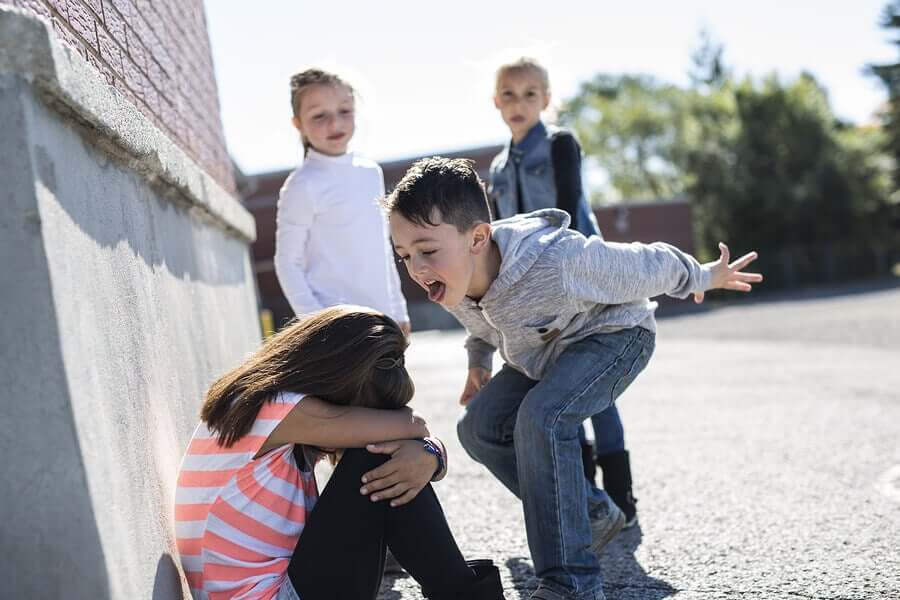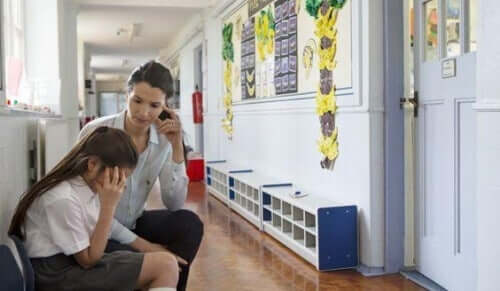What Should Parents Know About Bullying?

In an ideal world, bullying would always be resolved at school without any need for parental intervention. In practice, however, it’s not always a simple matter to solve, and there are different environmental factors that have a great influence.
Regardless of whether your child is the instigator or the victim, the reality is that when your child is involved in bullying at school, then your intervention as a mother or father will always be necessary.
Bullying is a situation of inequality, where there is an aggressor and a victim. It’s a relationship of dominance and submission, and includes verbal or physical abuse by one or more classmates.
Unfortunately, the problem isn’t an easy one to solve. All parties involved have to understand that changes are necessary. Under no circumstances can you ignore relationships based on fear and aggression.

General recommendations to prevent bullying at school
First, there must be an open climate of communication and trust at home. This will make it easier for the child to open up about a situation in which they’re having problems with their fellow students.
In addition to whatever action the school takes, parents should take part in bullying prevention activities carried out in schools and in their community.
It’s vital that children know they shouldn’t follow “the law of silence.” They should understand that, if they do, they would become complicit in the situation. They would become part of the problem and not the solution. You should always encourage them to talk about anything negative or unfair that has happened to them at school.
There are positive values that must be constantly reinforced: respect, solidarity and responsibility are three of them. Likewise, all the activities children take part in their free time should be supervised and monitored. These include video games, the movies they watch, and games played among classmates and friends, even their closest friends.
What should parents do when their child is a victim of bullying?
When there is even the slightest suspicion of bullying, you should look to increase communication between parents and children as much as possible. Children should feel that they have their parents’ unconditional support, without ruling out their own abilities to deal with the situation.
We shouldn’t fall into the trap of allowing our children to be completely dependent on their parents for any problem that comes up. That isn’t a good solution to the problem.
Here are some steps you can follow:
- Let the child vent their pain, anger or fear. Don’t interrupt them while they’re talking.
- Get into direct contact with both the school management team and your child’s teachers. You need to alert them to the situation as soon as possible, in order for them to investigate it and intervene to solve the problem as soon as possible.
- Under no circumstances should you encourage them to take revenge, or to be aggressive or violent with people when defending themselves.
- Depending on the degree of bullying, as well as the levels of anxiety and fear that the child is suffering, then it may be advisable to seek professional help.
- Keep calm, and always try to stay positive. At the same time, you’ll also need to be firm and to act with determination to stop the bullying.
What should parents do when their own child is the bully?
It’s often very difficult for parents to face the fact that their own child could be the aggressor and the one doing the bullying. In these cases we recommend that you work in conjunction with the educational institution, in order to apply the relevant corrective measures.

In order to resolve the situation, you’ll need to identify the triggers that are causing this behavior. Talk to the teachers. Listen patiently to all their observations concerning your child and also the victims. You’ll also need to ask for specific help to correct aggressive attitudes.
Again, we remind you of the importance of establishing good communication with your child, free from interference or a distortion of the facts. Avoid undue criticism, while at the same time recognizing that your child is responsible for their actions. Remember that every action, both good or bad, will always have consequences.
You must make it clear that you won’t tolerate such behavior. Another recommendation is for them to get involved in activities to improve interpersonal relationships with their fellow students.
These educational activities can take place both in the school or outside the school environment. There are many positive options available to solve the problem of bullying.
In an ideal world, bullying would always be resolved at school without any need for parental intervention. In practice, however, it’s not always a simple matter to solve, and there are different environmental factors that have a great influence.
Regardless of whether your child is the instigator or the victim, the reality is that when your child is involved in bullying at school, then your intervention as a mother or father will always be necessary.
Bullying is a situation of inequality, where there is an aggressor and a victim. It’s a relationship of dominance and submission, and includes verbal or physical abuse by one or more classmates.
Unfortunately, the problem isn’t an easy one to solve. All parties involved have to understand that changes are necessary. Under no circumstances can you ignore relationships based on fear and aggression.

General recommendations to prevent bullying at school
First, there must be an open climate of communication and trust at home. This will make it easier for the child to open up about a situation in which they’re having problems with their fellow students.
In addition to whatever action the school takes, parents should take part in bullying prevention activities carried out in schools and in their community.
It’s vital that children know they shouldn’t follow “the law of silence.” They should understand that, if they do, they would become complicit in the situation. They would become part of the problem and not the solution. You should always encourage them to talk about anything negative or unfair that has happened to them at school.
There are positive values that must be constantly reinforced: respect, solidarity and responsibility are three of them. Likewise, all the activities children take part in their free time should be supervised and monitored. These include video games, the movies they watch, and games played among classmates and friends, even their closest friends.
What should parents do when their child is a victim of bullying?
When there is even the slightest suspicion of bullying, you should look to increase communication between parents and children as much as possible. Children should feel that they have their parents’ unconditional support, without ruling out their own abilities to deal with the situation.
We shouldn’t fall into the trap of allowing our children to be completely dependent on their parents for any problem that comes up. That isn’t a good solution to the problem.
Here are some steps you can follow:
- Let the child vent their pain, anger or fear. Don’t interrupt them while they’re talking.
- Get into direct contact with both the school management team and your child’s teachers. You need to alert them to the situation as soon as possible, in order for them to investigate it and intervene to solve the problem as soon as possible.
- Under no circumstances should you encourage them to take revenge, or to be aggressive or violent with people when defending themselves.
- Depending on the degree of bullying, as well as the levels of anxiety and fear that the child is suffering, then it may be advisable to seek professional help.
- Keep calm, and always try to stay positive. At the same time, you’ll also need to be firm and to act with determination to stop the bullying.
What should parents do when their own child is the bully?
It’s often very difficult for parents to face the fact that their own child could be the aggressor and the one doing the bullying. In these cases we recommend that you work in conjunction with the educational institution, in order to apply the relevant corrective measures.

In order to resolve the situation, you’ll need to identify the triggers that are causing this behavior. Talk to the teachers. Listen patiently to all their observations concerning your child and also the victims. You’ll also need to ask for specific help to correct aggressive attitudes.
Again, we remind you of the importance of establishing good communication with your child, free from interference or a distortion of the facts. Avoid undue criticism, while at the same time recognizing that your child is responsible for their actions. Remember that every action, both good or bad, will always have consequences.
You must make it clear that you won’t tolerate such behavior. Another recommendation is for them to get involved in activities to improve interpersonal relationships with their fellow students.
These educational activities can take place both in the school or outside the school environment. There are many positive options available to solve the problem of bullying.
All cited sources were thoroughly reviewed by our team to ensure their quality, reliability, currency, and validity. The bibliography of this article was considered reliable and of academic or scientific accuracy.
- Dirección General de Familia y Menor. (2007). Atención al maltrato infantil desde el ámbito educativo (manual para el profesional). Murcia: Consejería de Política Social, Mujer e Inmigración.
- Piñuel, I., y Oñate, A. (2006). Test AVE, Acoso y Violencia Escolar. Madrid: TEA.
- Sanmartín, J. (2007). “Violencia y acoso escolar”, Mente y Cerebro, 26: 12-19.
This text is provided for informational purposes only and does not replace consultation with a professional. If in doubt, consult your specialist.








